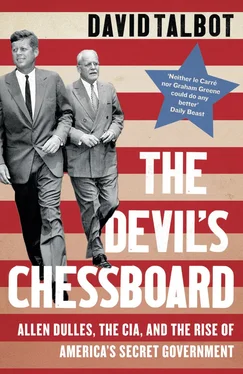And so, as midnight approached, a convoy of three cars set off toward the western shore of Lake Como. One vehicle carried OSS agent Scotti and three Swiss intelligence operatives, the second was filled with Italian partisans, and the third conveyed two SS officials Dulles had recruited to ease the convoy’s passage through German-controlled areas. It was one of the most bizarre missions in wartime Europe: a joint U.S.-German rescue effort organized for the benefit of a high-ranking Nazi general.
As the convoy crawled through the dark toward the lake, partisans opened fire on the cars. Scotti bravely jumped out of his vehicle and stood in the headlights, praying that the resistance soldiers would recognize him and stop shooting. Fortunately, one did. There was more gunfire and even a grenade attack as they continued their journey, but finally, the odd rescue team arrived at the Villa Locatelli. After talking their way past the partisans’ blockade as well as the SS guard, they entered the villa and found General Wolff in full SS uniform, as if he had been expecting them all along. He offered the rescue party some of the vintage Scotch he kept for special occasions, volunteering that the whiskey had been expropriated from the British by Rommel during the North African campaign.
It was after two in the morning when the caravan arrived safely back in Chiasso with their special passenger, who had changed into civilian clothes for the journey and was slumped low in the backseat of the middle car. Gaevernitz was anxiously awaiting the rescue team’s return in the dingy railroad station café. He had no intention of greeting Wolff in public. But when the SS general heard that Dulles’s aide was there, he bounded over to him and shook his hand. “ I will never forget what you have donefor me,” Wolff declared.
Dulles and Gaevernitz would learn that the SS man had a strange sense of gratitude. In the coming years, Wolff would become a millstone around their necks.
Later that morning, an exhausted Gaevernitz, who had not been out of his clothes all that night, took a train to his family’s lovely villa in Ascona, on Lake Maggiore, so he could enjoy a long sleep. At the railway station in Locarno, where he stopped for breakfast, he listened to the 7:00 a.m. radio broadcast, which was filled with news of Mussolini’s capture and other dramatic bulletins from the Lake Como area. Gaevernitz kept expecting to hear news of General Wolff’s rescue by a U.S.-led team of commandos; he was determined that his boss’s name must be kept out of the story.
“ It would have made a lovely headlinein the papers,” Gaevernitz later mused in his diary. “‘German S.S. General Rescued From Italian Patriots by American Consul’!!! Poor Allen!! I really felt I had to spare him this [embarrassment].”
It took Wolff several more days of high-stakes diplomacy before his maneuvers finally resulted in the surrender of German forces on the Italian front on May 2, 1945. By then, Hitler was dead, the German military machine had all but collapsed, and it was just six days before the capitulation of all Axis forces in Europe. In the end, Operation Sunrise saved few lives and had little impact on the course of the war. It did succeed, however, in creating a new set of international tensions that some historians would identifyas the first icy fissures of the Cold War.
The Dulles-Wolff maneuvers aggravated Stalin’s paranoid disposition. While he was still alive, Roosevelt, whom Stalin genuinely liked and trusted, was able to reassure the Soviet leader that the United States had no intention of betraying an alliance forged in blood. But after FDR’s death, Stalin’s fears of a stab in the back at Caserta—where the surrender on the Italian front was signed by German and American military commanders—only grew more intense. His suspicions were not unfounded. After the separate peace was declared at Caserta, some German divisionsin Italy were told not to lay down their arms but to get ready to begin battling the Red Army alongside the Americans and British.
Even Roosevelt’s successor, Harry S. Truman, who would become a dedicated Cold Warrior, took a dim view of Operation Sunrise and tried unsuccessfully to shut it down. T ruman later wrote in his memoirthat Dulles’s unauthorized diplomacy stirred up a tempest of trouble for him during his first days as president.
Operation Sunrise would become Allen Dulles’s creation myth, the legend that loomed over his entire intelligence career. For the rest of his life, the spymaster would energetically work the publicity machinery on “the secret surrender,” generating magazine articles and more than one book and attempting to turn the tale into a Hollywood thriller. It was, according to the story that Dulles assiduously spun throughout the rest of his life, a feat of daring personal diplomacy. Time magazine—which, under the ownership of his close friend Henry Luce, could always be counted on to give Dulles good press—trumpeted Operation Sunrise as “ one of the most stunning triumphsin the history of secret wartime diplomacy.” The reality, however, was far from triumphant.
Karl Wolff was Allen Dulles’s kind of Nazi. Like Hitler and Himmler, Dulles admired Wolff’s gentlemanly comportment and found him “extremely good-looking.” He struck Dulles as a man with the right sort of pedigree, the type of trustworthy fellow with whom he could do business.
Wolff liked to present himself as a high-level administrator who was unsullied by the more inhumane operations of his government. He was not one of the Nazi Party’s vulgar anti-Semites, he would later insist. He took pride in rescuing the occasional prominent Jewish prisoner from the Gestapo dungeons—a banker, a tennis celebrity, for instance. Eichmann sneeringly referred to Wolff as one of the “ dandy officers of the SS, who wore white gloves and didn’t want to know anything about what’s going on.”
Wolff was a financially savvy fixer, a man whom the Nazi hierarchy could rely on to get things done. After serving with distinction as a young army officer on the western front during World War I, Wolff originally pursued a career in banking, before going into advertising. But his ambitions in both fields were thwarted by Germany’s postwar economic crash. His decision to join Hitler’s rapidly growing enterprise, where he rose quickly through the ranks, was more of a professional decision than an ideological one. There were unlimited opportunities in the Nazi movement for a polished blond warrior like Wolff.
His business background gave Wolff cachet in the SS, where such skills were in short supply. It was Wolff who was put in charge of Himmler’s important “circle of friends,” a select group of some three dozen German industrialists and bankers who supplied the SS with a stream of slush money. “ Himmler was no businessmanand I took care of banking matters for him,” Wolff later recalled. In return for their generosity, the corporate donors were given special access to pools of slave labor. They were also invited to attend high-level government meetings and special Nazi Party ceremonies. It was said that Wolff took such good care of the wealthy contributors at the 1933 Nuremberg rally that they were pampered more than the Führer himself. On other occasions, the privileged circle of friends was even taken on private tours of the Dachau and Sachsenhausen concentration camps, escorted by Himmler and Wolff. Presumably the SS shut down the camps’ crematoria during the distinguished guests’ visits to spare them the unpleasant stench.
In pursuing the Sunrise peace pact, Dulles and Wolff harbored similar political motives. Both viewed the Soviet army’s advance into Western Europe as a catastrophe. But they also shared business interests. Throughout the war, Dulles had used his OSS command post in Switzerland to look out for Sullivan and Cromwell business clients in Europe. Stopping the war before these clients’ manufacturing and power plants in industrial northern Italy were destroyed was a priority for both men.
Читать дальше











